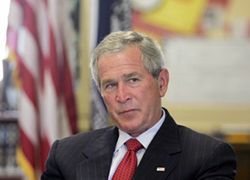Bush toughens ‘anti-terror’ laws
George Bush, the US president, has signed a law legalising the use of secret CIA prisons, harsh interrogation practices and military trials against suspected ‘terrorists’.

Bush called the Military Commissions Act of 2006 “one of the most important pieces of legislation in the war on terror” as he signed it into law at the White House on Tuesday.
The new law means Bush can continue a secret CIA programme for interrogating terrorism suspects.
The White House has refused to describe what interrogation techniques will be allowed or banned.
Bush said the law will also allow intelligence professionals to question suspects without fear of being sued by them later.
He said: “This bill spells out specific recognisable offences that would be considered crimes in the handling of detainees, so that our men and women who question captured terrorists can perform their duties to the fullest extent of the law.
|
“The men our intelligence officials believe orchestrated the murder of nearly 3,000 innocent people will face justice”
President Bush |
“It is a rare occasion when a president can sign a bill he knows will save American lives. I have that privilege this morning.”
The bill authorises tough interrogation of terror suspects and allows the US government to immediately begin moving toward their prosecution before military commissions.
Controversial
Bush signed the new legislation just six weeks after acknowledging that the CIA had been secretly interrogating suspected terrorists overseas and pressed Congress to quickly give authority to try them in military commissions.
“With the bill I’m about to sign, the men our intelligence officials believe orchestrated the murder of nearly 3,000 innocent people will face justice,” Bush said, referring to the September 11 attacks.
He added that he had signed the bill in memory of the victims.
Among those the US hopes to try are Khalid Sheikh Mohammed, the accused mastermind of the September 11 attacks.
Others who might face trial are Ramzi Bin al-Shibah, an alleged would-be September 11 hijacker who was denied a US visa before the attacks, and Abu Zubaydah, who was believed to be a link between Osama bin Laden and many al-Qaeda cells.